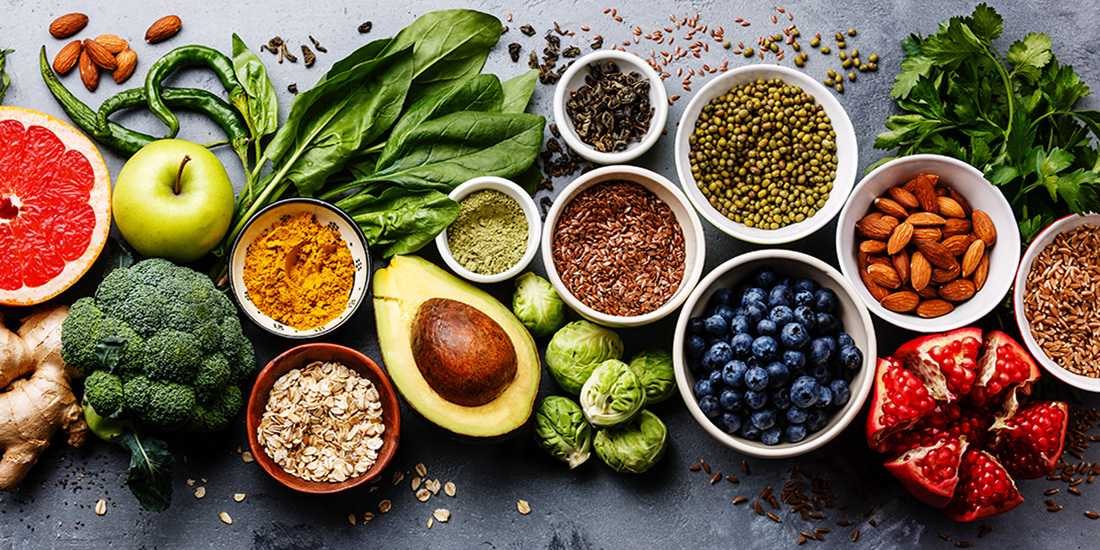 Contact
About Us
Articles
Home
Contact
About Us
Articles
Home

When it comes to eating healthy, you may have heard of superfoods. These foods aren’t going provide you with superpowers, but they do have some special health benefits, especially for older Americans. Superfoods are those that contain important nutrients that can enhance your healthy lifestyle and reduce chronic disease risk, in turn helping to improve the quality of life of your golden years.
Common superfoods are fruits and vegetables that are chock full of antioxidants that can help reduce inflammation. Not to mention that plant-based fats like olive oil and avocado as well as nuts and seeds can also provide anti-inflammatory benefits. Read below to learn the health benefits of superfoods and five superfoods you can add to your routine today to boost your health.
Research shows that an anti-inflammatory diet low in refined carbohydrates like white bread and sugar and high in plant-based foods can reduce markers of inflammation like C-reactive protein. Also, levels of blood fats like triglycerides as well as blood glucose can decline on such a diet.
Not only can super foods help fight inflammation, but they can also strengthen bones and boost the immune system, which can reduce your risk for illness. And these benefits are not just for your body, but also your mind. A 2018 research study shows that reducing inflammation in your diet can also lower your risk for depression.
Any brightly colored vegetable can qualify as a superfood due to the fiber, potassium and antioxidants they possess. But since there’s no room to name all the potential superfoods in this article, let’s focus on five such foods that can enhance your eating plan’s anti-inflammatory power today.
You may think that eating a lot of fat in your diet is unhealthy, but only if such fats are from saturated sources like fried foods, red meats and creamy soups and sauces, for example. There are healthy fats that come from plant-based sources like avocado, olive oil as well as fatty fish like salmon, trout, sardines and mackerel, for example.
Fatty fish contain omega-3 fatty acids that can reduce inflammation and in turn reduce joint pain and lower the risk of heart disease. Therefore, try to add one to two servings of fatty fish each week, with one serving equal to about 3.5 ounces.
Dark leafy green vegetables contain large amounts of the carotenoids antioxidants as well as nutrients like fiber, iron, magnesium, calcium and potassium as well as vitamins A, C, E, K and B. Examples of such leafy green vegetables include not only spinach, but also kale, broccoli, Brussels sprouts, Swiss chard, bok choy and mustard greens, to name a few.

Leafy green vegetables can benefit heart health, bone health, cancer prevention, and the fiber content can aid digestive health. Therefore, try to add a serving of such vegetables most days of the week for optimal health benefits. One serving is equal to about 2 cups raw or 1 cup cooked leafy green vegetables.
The blue, purple and red color of berries reveals the high content of anthocyanins and other antioxidants. Berries like blueberries, raspberries, marionberries, lingonberries and strawberries are also high in fiber and the powerful antioxidant vitamin C.
The antioxidants in berries can reduce inflammation and cell damage in the body and in turn can help lower the risk of heart disease, cancer and neurodegenerative diseases like Alzheimer’s disease. You should try to consume several servings of berries each week if you can to reap the health benefits. One serving of berries is equal to 1 cup berries or 1 cup sliced strawberries.
Nuts like almonds, peanuts, pistachios and walnuts are a plant-based source of protein, fiber and healthy unsaturated fats. Along with this, nuts also contain antioxidants like proanthocyanidins and flavonoids. Walnuts, pecans and chestnuts contain the highest amount of antioxidants among the tree nuts.
The nutrients and antioxidants in nuts reveal potential to reduce risk of obesity as well as related chronic diseases like heart disease and type 2 diabetes. You should eat 1.5 ounces of unsalted, dry-roasted nuts or 2 tablespoons of unsweetened nut butter about four times a week for optimal health benefits.
The anti-inflammatory effect of yogurt is in its good bacteria content that helps balance the gut and in turn reduce inflammation in the body. Yogurt is also a good source of calcium, which is good for bone health and is also a good source of protein. You should consume about 1 cup of yogurt every day if you can to reap its health benefits. Just be sure to choose yogurt brands that are 10 grams of sugar or less to reduce your total daily calorie and sugar intake.
Here are some tips on how you can add the superfoods listed above to your daily eating plan today.
Any change in diet can be overwhelming to begin. But by just adding one superfood to your diet each week and reducing sugar little by little you can reap the benefits of an anti-inflammatory diet. Small steps like these in your eating routine over time, along with staying active, can lead to great improvements in your health.
If you’re not sure how to start this healthy routine, don’t hesitate to call your health insurance company and see if they cover appointments with registered dietitians. These nutrition experts can look at your current diet and health status and help you gradually develop a healthier diet and healthier you.
Alliance America is an insurance and financial services company. Our financial professionals can assist you in maximizing your retirement resources and achieving your future goals. We have access to an array of products and services, all focused on helping you enjoy the retirement lifestyle you want and deserve. You can request a no-cost, no-obligation consultation by calling (833) 219-6884 today.


